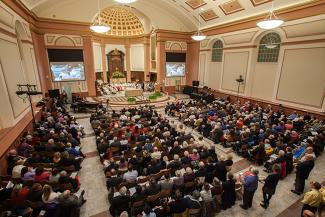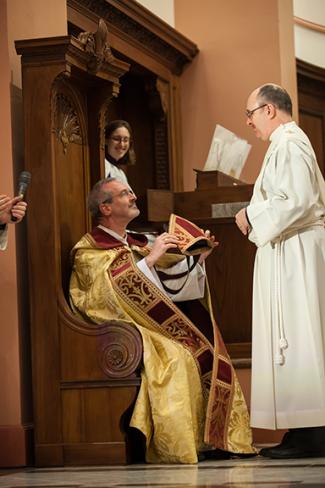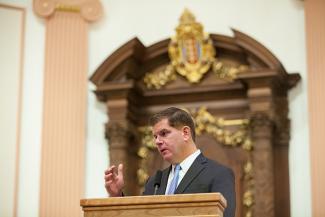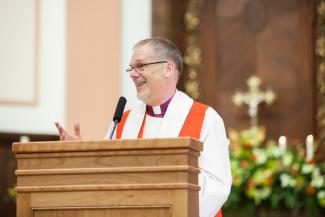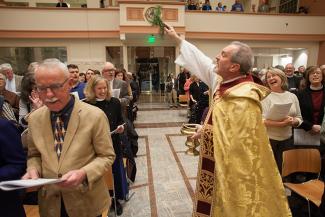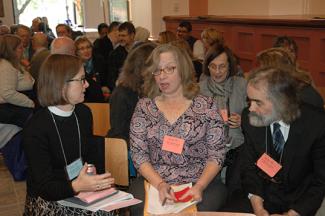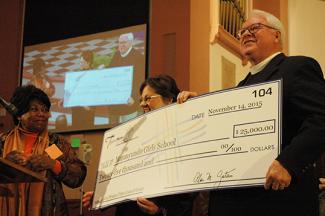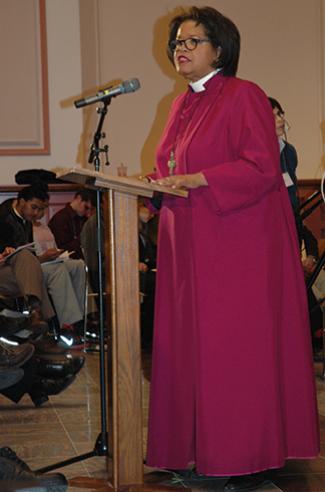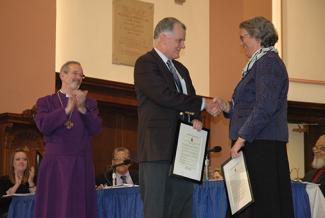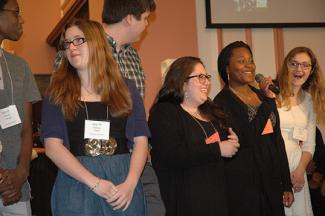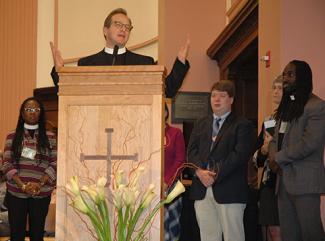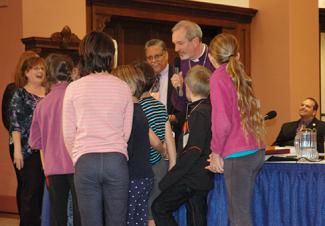Gathering for the first time for worship and work in the newly renovated Cathedral Church of St. Paul in Boston, this year’s annual Diocesan Convention had a special spirit of celebration about it as it voted its positions on world concerns and deliberated over mission matters closer to home.
About 500 clergy members and lay delegates representing the diocese’s congregations gathered for the Nov. 13-14 convention, which began with a special Friday evening service to rededicate the cathedral church—closed for renovations since April of last year. Bishop Alan M. Gates, who completed his first year as bishop while the cathedral church was under reconstruction, was officially seated during the service.
“Well thank you, Diocese of Massachusetts, for finally letting my friend Alan sit down,” said the special guest preacher, Bishop Douglas J. Fisher of the Diocese of Western Massachusetts.
He preached about the power of living into one’s name, and challenged the congregation to “proclaim the Gospel boldly and live it in this place” as St. Paul did. [Video and text of Fisher’s sermon are available here.]
The service was filled with both traditional and celebratory moments—from Gates’s opening knocks at the door and the sustained cheers and applause when he took his official seat in the bishop's chair, to the sprinkling of holy water across the new space and the congregation.
But with news breaking of terrorist violence in Paris, the service opened on a solemn note with prayer and silence.
“As we begin this night, a night to celebrate, a night when we are gathered in God’s name, elsewhere on this planet there is violence,” the Rt. Rev. Gayle E. Harris, Bishop Suffragan of Massachusetts, said. “So as we celebrate let our hearts and our minds also lift others in prayers, that we might find ways with them to be at peace rather than violence. Lord, be with those who watch or weep this night.”
Boston Mayor Martin J. Walsh came to offer his greetings, saying that the Cathedral Church of St. Paul is an important part of Boston’s history. “You have a strong legacy of forward thinking and a compassion to everyone seeking God’s help,” Walsh said.
He noted the nautilus sculpture in the cathedral church’s pediment facing Boston Common.
“It’s a symbol that might not fit most cathedrals, but it fits this one, this unique place and community. You are not afraid to grow and expand your conversation about faith while holding on to your fundamental beliefs,” Walsh said. “At night the shell lights up downtown and is a beacon of hope to all. Throughout the years you’ve opened your doors to people from different faiths and different backgrounds. You’ve been a source of support during times of joy and times of tragedy. You reach out to the homeless men and women with blankets, warm meals and spiritual support, and I thank you for that. The arms of this church are big enough to wrap around our entire city.”
Bishop Stephen T. Lane of the Diocese of Maine was also a special guest. As president of Province I of the Episcopal Church, he brought greetings on behalf of the New England dioceses.
“This is a delight,” Lane said of the renovated cathedral church. “Rejoice in it. We in New England are delighted to share with you in life and ministry. Please accept our prayers and our fervent hope that you and your bishop will grow and flourish together in ministry for many years to come. Thanks be to God.”
An offering of $4,589 was collected during the service for Episcopal Relief & Development’s Syria relief fund—an effort supported by a resolution adopted during the full day of regular Diocesan Convention business that followed on Saturday. [Find more photos from the rededication and seating service here.]
Walking together
“I thank God that we are journeying together,” Gates said in his address to the convention on Saturday morning. He likened that journey to the experience of walking a labyrinth, which, unlike a maze with its dead ends and tricks, is actually one winding path.
“And I want to suggest that our very diocesan life together is a labyrinth, a path upon which we encounter one another and walk together, into the center, and back out to the world,” he said.
He referenced the diversity of people, churches and worship styles across the diocese, as well as various ways that faithful individuals and congregations are engaging the work of the Gospel through their advocacy and ministries.
The plight of global refugees is a new area of awareness for many, he said, and one that demands attention. He announced a Dec. 12 “Refugee Ministry 101” seminar for those interested in learning more about how to respond.
“Receiving and sponsoring refugee families is a significant and long-term commitment, requiring the proverbial ‘village’ approach, perhaps with neighboring Episcopal or ecumenical partner churches,” he said.
He also spoke about “the intertwining evils of gun violence and racism” and commended the participation of the diocese’s B-PEACE group, together with the Greater Boston Interfaith Organization, in a national gun safety campaign called Do Not Stand Idly By. A Jan. 31 training for those interested in joining the effort will be offered.
On the subject of racial injustice, he described the ongoing efforts of the diocesan Antiracism Task Force, working with other New England dioceses, and the many congregations that "are finding their own ways to engage this essential conversation."
He cited Ta-Nehisi Coates's book Between the World and Me, which convicts “good intentions” as “a hall pass through history.”
“I call upon us all to engage the work of antiracism, and to keep one another accountable, that we not settle for ‘good intentions’ only,” Gates said. [Video of Gates's address is available here, and the text here.]
Discerning a new mission strategy
Later in the day, the convention heard a report from the design team that has been at work since May devising a process by which input can be widely gathered from across the diocese to inform the development of a new mission strategy for the diocese. That new strategy will be presented in final form for approval at Diocesan Convention next year.
Open forums in January, as well as focus groups and online and phone surveys, are part of that listening process. Gates in his address described it as “conversations all over our diocese to listen for the direction of God's call, here and now.”
“We know that as individuals and households we often have to decide how to use our time, how to use our resources, how to arrange our priorities. The same is true of congregations. The same is true of our diocese. That is the goal of setting our mission strategy together,” he said.
“My vision for the Diocese of Massachusetts is that it is a large and diverse body of Christians who are nonetheless committed to listening deeply to one another, and discerning together what God wants most from us at this time. My vision and your vision are to become, by the work of the Holy Spirit, our vision, for our diocese.”
Celebrating mission partnerships
The Maranyundo School for Girls in Rwanda, supported by its local mission partner, Trinity Church in Concord, received this year's Mission Tithe Council Grant of $25,000, presented at the convention. The school's mission is to educate economically vulnerable girls who would otherwise not attend school after the sixth grade. The money will help fund the middle school's expansion to include high school for its students. This year’s award was the last of four annual grants funded by the diocese's Together Now campaign.
The convention also heard presentations from the organizers of the diocese’s three newest mission hubs: one on the South Shore working to provide programs for at-risk youth; one in Roxbury and Dorchester that plans to galvanize youth, elders and immigrants along the Dudley Corridor with language programs and relationship building across diverse populations; and one in Boston and Cambridge that plans to launch a network of long-term intentional communities supporting the vocations of lay people.
These new sites make a total of eight mission hubs—part of the collaborative initiative funded by the diocese’s Together Now campaign to bring Episcopal churches together to address local needs.
Since the pilot mission hub was established on the South Coast in 2012, interest in the initiative and the number of viable hub proposals have surpassed the funds available.
Convention heard a report about a focused fundraising initiative being developed to bridge the funding gap. Parishes will have the option of conducting collaborative campaigns with consultant and administrative support provided. Seventy percent of the funds they raise through these campaigns will stay in the parish for their own local needs; 30 percent will support the mission hubs.
Fossil Fuel Free Fund announced
In response to a 2013 Diocesan Convention resolution requesting a fossil fuel-free investment alternative, the Trustees of Donations and the diocesan Financial Advisory Committee announced the opening of the newly established Diocesan Fossil Fuel Free Fund.
The Diocesan Council, the body which conducts diocesan business between conventions, has approved an initial investment of $8 million in the new fund. [Read more about the new fund here.]
Resolutions
The convention approved two resolutions focused on the Middle East, with the discussion in support of each highlighting concern about the diminishing Christian presence there. No one spoke in opposition to either resolution.
One resolution acknowledges persecution of Christians and other religious minorities in the Middle East, calls for prayer on their behalf and urges financial support for them through Episcopal Relief & Development.
(While Episcopal Relief & Development does not have a program that aids persecuted peoples specifically, it does provide emergency assistance through its ongoing disaster response efforts, according to Malaika Kamunanwire, the organization's senior director for marketing and communications. An example is Episcopal Relief & Development's partnership with the Fellowship of the Middle East Evangelical Churches to offer support to displaced people in Syria and around the region.)
“The tragedy of the persecution of Christian populations comprising the Episcopal Diocese of Jerusalem and beyond, as well as other minority religions, has been demonstrated by the drastic decline in their numbers,” Michael Robbins, a delegate from the Church of Our Saviour in Brookline, said in support of the resolution. “The response of the American churches has been in my opinion inadequate,” he said.
Bishop Gayle Harris also spoke in support of the resolution. “I want you to please note that while we pray for Christians we also are asking your prayers for those in other religious minorities that are also facing violence against them,” she said. “Yes, Christians are suffering. Particularly in Israel and Palestine, Christians are leaving because of governmental policies of the Israeli government, but elsewhere it is because of sectarian division.”
Convention adopted a second resolution supporting in general the initiatives of the diocese’s Middle East Network group, which encourages members of the diocese to visit the West Bank of Palestine “to witness what life is like for those living under military occupation” and to develop relationships with churches and institutions in the Episcopal Diocese of Jerusalem, which comprises Israel, Palestine, Lebanon, Jordan and Syria.
The resolution also asks the Middle East Network group to encourage congregations to seek financial assistance for mission pilgrimages to the Diocese of Jerusalem through the diocesan Mission Tithe Matching Grant program. The Mission Tithe Matching Grants are funded by money raised through the diocesan Together Now campaign and were established to foster and expand congregation-based global mission relationships--especially those with a hands-on mission component, according to grant program materials.
Harris, in presenting the resolution, announced that she and Bishop Gates would be departing the following day, with 26 other travelers, for the latest in a series of diocesan mission pilgrimages of the kind called for by the resolution.
“We are going to undertake not only a spiritual journey where Jesus walked but to understand life for the religious minority of Christians in that land where Jesus was born,” she said. “I've been inspired so many times when I’ve gone there to see our sisters and brothers living under oppression only because they are Palestinian and they are Christian. There are times when whole towns were 100 percent Christian, and it's now to the fact that there's only one 100-percent-Christian town in Israel and the West Bank, and that is Taybeh,” she said.
“We really ask that this diocese take this commitment on entirely of supporting this diocese in Jerusalem, supporting our people who are seeking to tell truth with that strength and that sense of peace that only you can understand through Jesus Christ. We ask your support, we ask you to come with us on our pilgrimage, we ask you to pray for peace in Jerusalem,” she said.
Several others spoke of how visiting the Holy Land had affected them personally.
James Dilday, a delegate from St. Cyprian's Church in Roxbury, described his experience on a 2009 diocesan mission pilgrimage. “It opened my eyes as to the issues that we see there involving the Christians in that community,” he said. “We saw firsthand the fact that the Palestinian people don't have water when they need it. They have to have cisterns on the roofs of the buildings to collect water so they have fresh water to drink. They cannot go into Tel Aviv to use an airport to fly out of the area,” he said.
The Rev. Ray Low, a retired priest, said that witness leads to speaking out. “As one who has been to the Holy Land three times and observed firsthand the effects of 50 years of military occupation of the West Bank, I returned feeling an inner turmoil to honor my baptismal vow to strive for justice and peace among all people and to respect the dignity of every human being, or to remain silent knowing full well that to say nothing is a vote for the status quo,” Low said. “Israel and the United States are long-standing friends; however, when a friend is acting unjustly, as a friend, we must tell them this, you're doing wrong. We have to speak the truth in love.”
Convention also approved a resolution in response to Latin American migration. It supports the U.N. Declaration of Human Rights as the standard of treatment for people fleeing their countries, and specifically commends initiatives that work toward addressing the root causes of Latin American migration. It also calls on the Episcopal Public Policy Network of the church's Office of Government Relations to advocate that the U.S. government revise its interception policy for migrants at southern border crossings, that it stop detaining asylum seekers with credible claims and that it play a role in supporting the governments of Mexico, El Salvador, Honduras and Guatemala to address the issues that lead masses of people to leave those countries.
Convention amended the resolution to specify its desire that the U.S. government’s role be a “positive nonviolent” one.
In presenting the resolution, the Rev. Martha Hubbard of St. Paul’s Church in Newburyport asked Convention to recall the 2014 media coverage of Central American children arriving at the southern border of the U.S. “And now we don't hear of that happening much anymore. It’s because of our government’s policy of border externalization, by which we have Mexico intercept these children and other migrants before they can reach our border,” she said. “The U.N. Charter of Human Rights provides for people who are fleeing for their lives to be granted refugee status when they reach a border with another country. Our policy of border externalization does not allow people fleeing violence in Central America to exercise that basic human right.”
“That is why we believe it is important that we enlist the Episcopal Public Policy Network and our lobbying office in Washington to advocate at the level of our national government, and we hope that the aspirations we are currently undertaking as a diocese to aid Syrian refugees will be expanded to take in refugees from Central America also,” the Rev. Edgar Gutierrez-Duarte of St. Luke's-San Lucas Church in Chelsea and a co-presenter of the resolution, said. "And we hope that from this point of raised awareness further faithful action will flow for the sake of our brothers and sisters of Central America,” he said.
The Rev. Lisa Fortuna of Iglesia San Juan and Christ Christ in Hyde Park said that young people make up a large percentage of refugee populations--as much as 60 percent--and she described, as a mental health clinician, doing asylum evaluations for children as young as six facing deportation without guarantee of legal representation. She urged response “both at a policy level in our country, which has to respond to this human crisis, but also as we respond with our faith and our hands and our hearts in our communities and diocese.”
All resolutions in their final form are available here.
In other business the convention:
•Adopted, without discussion, the $9-million budget proposed for 2016--balanced with $6.9 million in core revenues and expenses and $2.1 million in supplemental ones.
•Elected John Iredale of the Parish of St. Chrysostom in Quincy to the diocesan Standing Committee. (Results of uncontested elections are listed here.)
•Approved clergy compensation guidelines for 2016.
•Amended diocesan Canon 8 to allow for expanded membership on the Commission on Ministry, the body with responsibility for the ordination process, and then went on to appoint commission members (listed here).
•Amended, on first reading, Article 2 of the diocesan constitution, clarifying that all members of Diocesan Council are entitled to vote at the convention. A second reading is required next year before the amendment can go into effect.
•Heard a report from the diocese’s General Convention deputation that included reference to resolutions deemed the “Top 17 for Parishes” (available here).
--Tracy J. Sukraw
Links:
Diocesan Convention 2015 Actions
Video of Bishop Gates's address
Text of Bishop Gates's address
Bishop Fisher's sermon at the rededication and seating service
Photos from the rededication and seating service

